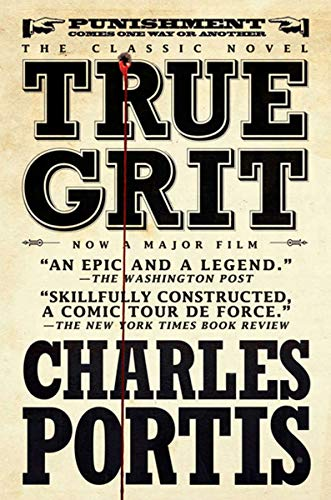Time just gets away from us with True Grit.
Last week was magical. I stumbled upon the 2010 Coen Brothers’ film, True Grit, and was so besotted with it that I went down the True Grit rabbit hole: the 1969 classic starring John Wayne, Charles Portis’s book, and the audiobook read by the delightful Donna Tartt. I passed out on True Grit every night, only to wake up hungry for more. As my options to continue in True Grit’s magical world dwindled, I reviewed the Coens’ film on my blog. But I am still reluctant to leave and hence this piece.
The joy of a True Grit binge is that the movies make the book come alive. The two movies complement each other, creating as complete a picture as possible. The John Wayne film is unhurried, with many satisfying details from the book, like the beginning where we see the Ross family seeing off the dad. The Coens film, on the other hand, begins after Mattie’s father dies. Similarly, the Coens’ film mostly has dark and muted hues, and the Wild West appears harsh and unforgiving. On the other hand, the 1969 film shows you the idyllic West in all its colorful glory, with its lush green trees and sparkling rivers. I was disappointed to see Mattie fetching water from a little ditch in the 1969 film, but the Coens film made up for it with its gurgling river. The John Wayne film dilutes the book’s powerful ending by only hinting at it, but the Coens film stays faithful to the original and even transcends it with its powerful closing song.
True Grit, like any other great novel, is a good story. It is an adventure we all wish we had as kids. The book is way ahead of its time, with a fourteen-year-old plucky devout Christian, Mattie Ross, as its central character. She is adept at bookkeeping, law, and riding. She tolerates no fools yet is compassionate and sees even the deadliest criminals as sinners needing redemption. Although Mattie’s life is at risk because she’s pursuing a dangerous criminal, she’s at no risk of being sexually assaulted by the men around her.
Mattie Ross is the book’s steady spine, who wills her way through any challenge, although it’s evident she grew up protected and may be too smart for her good. She watches hangings, sleeps among corpses, and overtakes the fleeing Cogburn and LeBouef, who think she’ll be trouble. Mattie is our role model of confidence, at ease with anyone (although she confesses she was self-conscious in the handsome LeBeouf’s presence). Portis’ details about her sensitivity make the book unique. Mattie asks her trusted servant Yarnell if he’s eaten before he embarks on his long train ride home; and assures a dying outlaw she will give him a decent burial. Perhaps this sensitivity makes tough old men like Cogburn or even Ned Pepper open up to her and talk to her like equals, although it’s hard to imagine they have any previous experience dealing with little girls.
Young Mattie’s inherent goodness gives the book its lasting appeal, and it is reassuring that the older Mattie, who narrates the story, hasn’t lost her moral compass or spunk. The book satisfyingly ties up all the loose ends; Mattie tells us what happened to each of the characters in her youth, like how she kept in touch with Yarnell and even attended his funeral. Or her assuming the responsibility of caring for her aged mother so her siblings could be free. Mattie does not let us down by not deciding to marry for marrying’s sake.
It’s the little details about young Mattie’s character that make her unforgettable. Despite being a good bargainer and even a penny pincher, money doesn’t matter to her for the things that count: she doesn’t argue when she’s ripped off for her father’s coffin (the films show her arguing over the coffin expenses, diluting her goodness). Or her attachment to her beloved pony Little Blackie. We get satisfying details of how he enjoyed the salty corn dodgers. His eventual death from exhaustion after running without a break to save Mattie’s life and her homage to him brought me to tears when listening to Donna Tartt’s narration. “Blackie fell to the ground and died; his brave heart burst and mine broken. There never lived a nobler pony.”
True Grit is a tribute to the most profound friendship, yet the friends never once profess their liking for each other. Cogburn has the brawn and Mattie the brains, and both silently acknowledge it. They are an unlikely pair; Mattie’s innocent ferocity warns Cogburn not to mess with her. She, too, knows when to back off. He saves her life, risking his own, and how beautifully she returns it. Writer Ian Frazier opened my eyes to the enormity of Mattie’s final act of relocating Rooster’s body to her family plot, which is moving in itself. But as Frazier points out, she had him dug out of his Confederate grave and moved to Little Rock.
But for me, the most moving core of True Grit is how love lurks at the most unexpected corners. Rooster Cogburn is an alcoholic, feared, loathed, lonely, a vagabond, forgotten and reduced to a circus entertainer in his old days, who has to hustle for a living until the end. And yet, unknown to him, his old pal Mattie ensures him eternal dignity in her family plot. What could be more human than that?
Voltaire said good writing should be as clear as a brook. Portis’ writing flows like a clear mountain brook, even though Mattie Ross speaks an alien language. If Wikipedia is to be believed, Portis picked up this language when working for the local Arkansas paper early in his journalistic career. His job there was to redact portions of the colorful and exaggerated stories some local ladies would send for publication. It’s not hard to believe this because Mattie speaks with the conviction of a devout Presbyterian who sees the world in black and white. But the thinly veiled sarcasm and pettiness that informs every character’s small-town worldview make the book and films so unintentionally funny.
Wells Tower’s 2020 New Yorker obituary to Portis sums up why True Grit grips you inexplicably. Tower says Portis’ books make you feel less mean because they are gentle and funny. Furthermore, Portis’ books allow you to escape into a world of small but important virtues like punctuality, moral continence, and straight talk. Charles Portis surprised his fellow journalists in London when he suddenly decided to quit his blossoming career to retreat to a cabin in his hometown in Arkansans to write novels. No one even knew he wanted to write fiction.
Today, self-proclaimed motivational gurus shout from the rooftops about passion and grit (a field of study at UPenn). But Charles Portis shows us that true grit is reflected in your silent bold actions.


